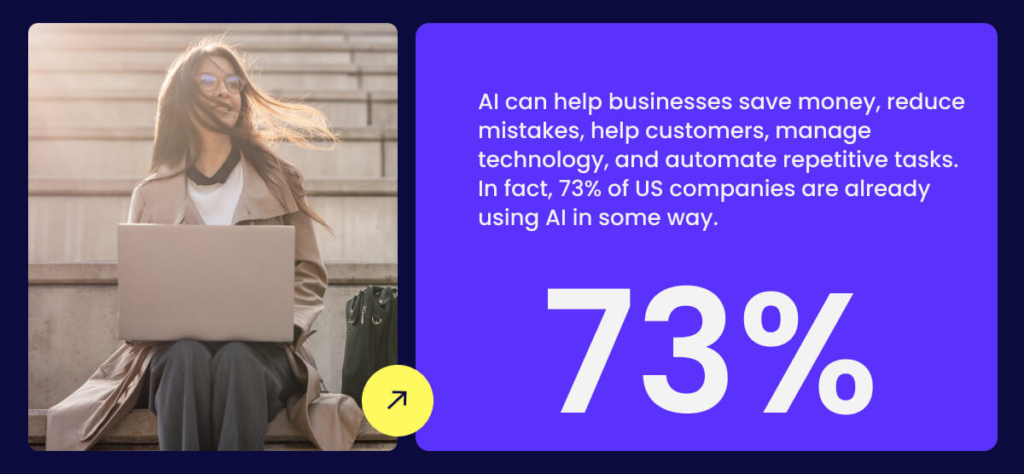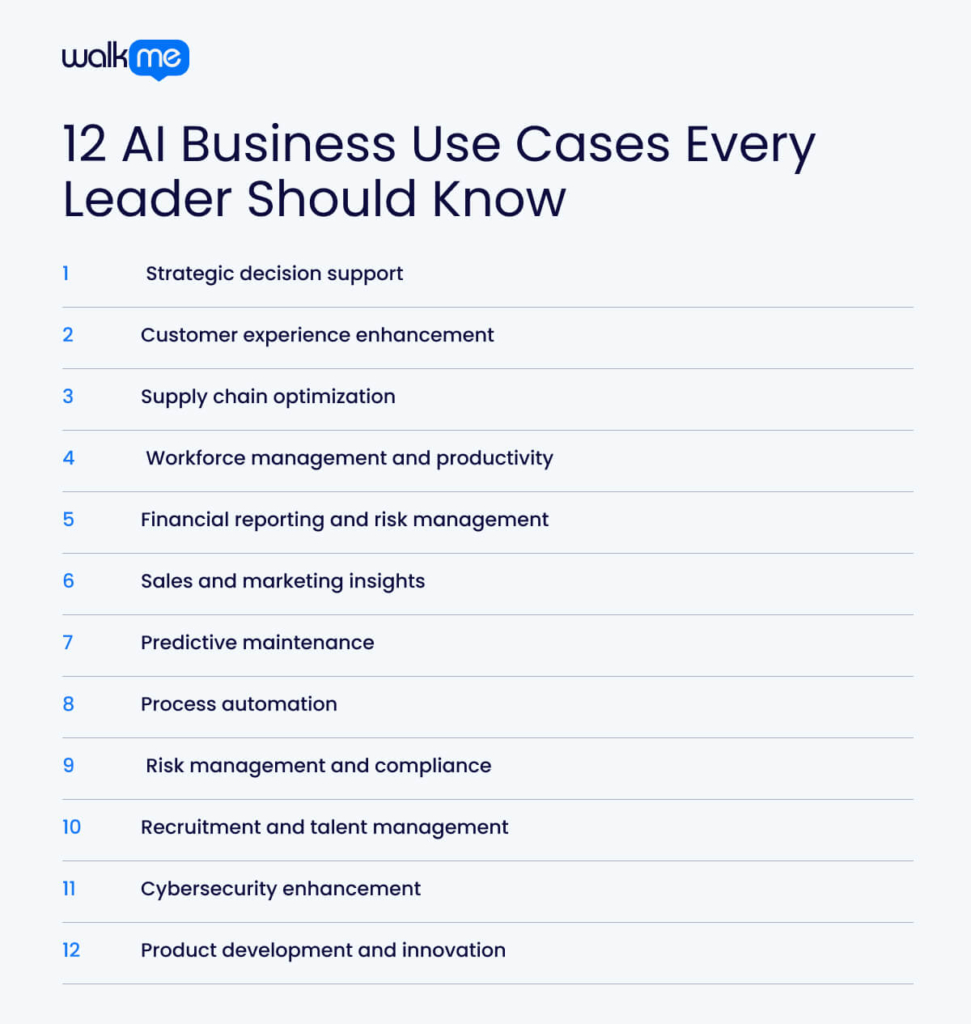Poor business transformation planning can lead to missed opportunities and hard-to-solve problems. To avoid these problems, businesses are now turning to AI.
AI can help businesses save money, reduce mistakes, help customers, manage technology, and automate repetitive tasks. In fact, 73% of US companies are already using AI in some way.

In this article, we will look at twelve AI use cases that can help businesses remain competitive.

1. Strategic decision support
AI offers significant strategic benefits for businesses. It quickly analyzes market data to identify trends, challenges, and opportunities, helping companies make informed decisions.
AI also monitors competitors and predicts their moves, allowing for better strategic planning. It optimizes resource allocation, ensuring focus on high-impact areas. Additionally, AI forecasts customer behavior, aiding in product development and marketing.
For instance, Shell uses AI to enhance oil exploration by analyzing seismic data and optimizing drilling. In customer service, AI supports electric car charging stations, monitors safety, and assists with inventory planning, demand forecasting, and energy management.
2. Customer experience enhancement
AI personalizes interactions and recommendations based on customer preferences and behaviors, boosting satisfaction and loyalty. It uses data from sources like purchase history and browsing habits to create a tailored customer experience.
AI chatbots are transforming customer service in banking. These virtual assistants are available 24/7, providing instant responses and solving common issues without human help. They can handle tasks such as answering questions, managing accounts, and processing transactions.
For instance, Bank of America’s chatbot, Erica, interacts with clients 2 million times daily. It helps customers track subscriptions, understand spending, and stay updated on deposits. Erica has answered 800 million questions, providing responses within 44 seconds in over 98% of cases. For more complex issues, it connects customers with live representatives. Since its launch, the bank’s data science team has made over 50,000 updates to improve Erica’s performance.
3. Supply chain optimization
AI can greatly improve supply chains in several ways. AI analyzes data to predict future demand. This helps companies manage inventory better and avoid running out of stock or having too much. AI also automates supply and demand planning. This enables businesses to prepare for shortages and reduce excess inventory when demand drops. Additionally, AI detects manufacturing problems early. This helps lower costs and prevent delays.
AI reviews past and real-time data to predict demand, optimize inventory, and improve logistics. This reduces the risk of stockouts or overstocks. AI algorithms analyze large data sets to find patterns and trends. This information supports informed decision-making.
For example, Amazon uses AI to enhance same-day shipping. The technology helps optimize delivery routes, create smarter robots, and predict where to stock new items.
In 2022, Amazon added AI models to its delivery robots. These robots can move around more intelligently and avoid obstacles. They reduce employee workload by bringing bins to packing stations and cutting down on walking. In the first quarter of 2024, Amazon delivered over 2 billion items the same day or the next day.
4. Workforce management and productivity
AI is making many jobs easier. One way is by helping companies schedule their workers better. AI can look at things like who is available, how busy the business will be, and what skills people have to create the best schedule.
AI can also help people do their jobs better. It can use advanced language models and machine learning to make tasks faster and easier. This can help companies be more productive and make more money.
For example, Walmart uses AI to help its employees reduce food waste. AI can tell employees when fruit is ripe or when to put clothes on sale, helping Walmart save money and reduce waste.
5. Financial reporting and risk management
AI can help businesses manage their money better by analyzing financial data to predict the future. This helps businesses make better decisions about how to spend money and reduce risks.
Finance teams have a lot of data to look at, and finding important information is challenging. AI can help by automatically analyzing data and finding patterns that people might miss. This helps finance teams make better decisions about lending money, managing risk, and deciding who to lend to.
AI can also help businesses follow financial rules and regulations. It can automatically check transactions and find suspicious activity, reducing the risk of breaking the law.
For example, J.P. Morgan uses AI to check payments and reduce fraud. They also use AI to make sure that bank accounts and transactions are safe.
6. Sales and marketing insights
AI can help businesses understand their customers better. It can predict which customers might stop buying, bring back customers who leave their shopping carts, and help businesses make more money. AI can also help find new customers, talk to them automatically, and send them personalized messages.
Coca-Cola uses AI to make its business more efficient. They have a system called Cola 3000 that analyzes data to predict how much product to make and where to sell it. This helps them save money and ensure customer delight. Cola 3000 also helps Coca-Cola understand what customers like and dislike. This helps them target their marketing efforts and make better products.
7. Predictive maintenance
AI can help machines last longer by predicting when they need repairs. By looking at machine data, AI can find problems before they become big issues, making workplaces safer and more efficient.
For example, Alcon, a company that makes eye care products, uses AI to keep its machines running smoothly. AI helps them find problems early and fix them quickly, saving time and money.
Real-time insights help Alcon spot trends that are hard to detect manually. This allows them to optimize maintenance and ensure equipment runs as needed to meet business goals.
If a product is rejected, the AI can pinpoint the cause and suggest corrective actions. Without AI, this process could take days as experts analyze images and data to find problems.
8. Process automation
AI can make many business tasks easier.
One way is by automating tasks. AI can do things like data entry and report writing, so people can focus on more important things. For example, Cigna uses AI to process insurance claims faster and more accurately.
In healthcare, Cigna with Evernoth uses AI to predict health problems before they happen, helping patients get better care.
AI can also help businesses make better decisions by analyzing lots of data. It can find patterns, predict trends, and even spot fraud. AI chatbots can answer customer questions, and AI can help businesses manage their resources and sales.
9. Risk management and compliance
Regulatory compliance refers to following the rules set by the government. AI can help with this by automating tasks and analyzing legal documents. It can also predict future changes in regulations.
By automating tasks like data validation and risk assessment, AI allows compliance teams to focus on more important work, lowering costs and improving management.
For instance, HSBC partnered with Google Cloud to create an AI solution that detects suspicious activities independently. This Anti-Money Laundering AI (AML AI) was trained on customer data to identify suspicious patterns more accurately than manual methods.
10. Recruitment and talent management
AI can make hiring easier for companies. It can sort through resumes, find the best people for jobs, and even conduct video interviews, helping companies hire people faster.
For example, Unilever uses AI to interview job candidates. The AI watches the candidates and listens to their answers, then gives them a score. This helps Unilever find the best people for the job.
AI can also help employees grow and learn. It can suggest training courses and connect employees with other people in the company.
11. Cybersecurity enhancement
AI can help businesses stay safe from cyberattacks. It can analyze large amounts of data to find threats and stop them quickly, and it can even learn to spot new types of attacks.
AI can also help protect your company’s information. It can watch for unusual activity and stop unauthorized access. It can also make sure your devices are up-to-date and secure.
AI is good at spotting fake emails and other tricks hackers use. For example, IBM’s AI can help protect businesses by learning to recognize and stop cyber threats.
12. Product development and innovation
AI is making product development quicker, smarter, and more creative. It helps teams understand what users want and gives them new ideas to explore. AI can automate tasks, find patterns in data, test different materials, and suggest design improvements.
Netflix is a great example of how AI can be used. It uses AI to suggest shows and movies you’ll like based on what you’ve watched before. AI also helps Netflix decide what new shows to make by looking at what people like and what’s popular.
For example, AI helped Netflix figure out that people were interested in political dramas with certain actors, leading to the creation of ‘House of Cards’.
Use AI as a strategic asset for your business
AI can make your business better by making things faster, smarter, and more creative. It can help you make better decisions, find new ideas, and keep customers happy. AI can also help you spot problems before they get bigger.
Instead of taking jobs, AI helps people do their jobs better by taking care of boring tasks.
While adding AI to your business might seem difficult, consider it a helpful tool. Talk to your employees about AI and train them to use it. By working together with AI, you can make your business smarter, faster, and more successful.
FAQs
Businesses can use AI to improve customer experience, accounting, data analysis, content generation, IT operations management, and fraud detection. It can also ensure more effective management of their supply chain, employees, and legal matters.
The industries that will benefit the most from AI include finance, healthcare, retail, manufacturing, logistics, marketing, education, cybersecurity, customer service, transportation, real estate, and legal.

